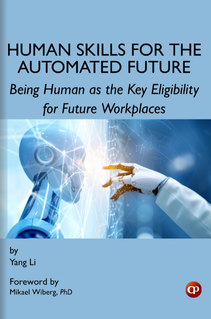The Skills That AI Can’t Replace

by Yang Li
Academic Researcher & K-12 Consultant, Jiangsu-Nanjing 210023, China.
10.46679/9788196780586ch02
This chapter is a part of: Human Skills for the Automated Future: Being Human as the Key Eligibility for Future Workplaces by Yang Li
ISBN (Ebook):978-81-967805-8-6
ISBN (Softcover Print):978-93-49926-23-3
© CSMFL Publications & its authors.
Published: May 15, 2025
Abstract
The increased adoption of artificial intelligence in professional work environments has also led to a need for distinctly human competencies. This chapter examines human capabilities that AI cannot replicate and will remain indispensable. Critical thinking emerges as a significant differentiator in light of AI’s limitations. While AI demonstrates proficiency in data analysis and automation, it lacks the capacity to see across assumptions, evaluate information objectively, and construct robust arguments independently. Individuals must develop the ability to assess AI outputs critically and apply analytical reasoning to complex situations.
Human creativity surpasses contemporary AI’s current capabilities. Although AI generates content and solves problems creatively, it encounters difficulties with genuine innovation and human emotional connection. Personal experiences, imagination, and emotional intelligence come together to produce work that resonates profoundly with others. Humans excel in emotional and interpersonal competencies. AI cannot match human abilities in emotional comprehension, relationship building, and social behaviour. Effective workplace relationships depend on empathy, active listening, and receptive communication—skills preferred when collaborating with both human colleagues and AI.
Future success depends to a large extent on the development of these distinct human abilities. Young professionals who recognize and improve these skills will thrive in future work environments. This chapter helps in understanding AI-integrated future workplaces where human-AI collaboration determines professional achievement.
Keywords: Artificial Intelligence (AI), Critical Thinking, Information Literacy, Creativity, Emotional Intelligence
References
- Cherry, K. (2023, December 31). 5 Key Components of Emotional Intelligence. Verywell Mind. https://www.verywellmind.com/components-of-emotional-intelligence-2795438
- Cropley, D. (2023). Is artificial intelligence more creative than humans? Learning Letters, 2, 13–13. https://doi.org/10.59453/ll.v2.13
- Gaggioli, A. (2017). The Rise of the Creative Computers. Cyberpsychology, Behavior, and Social Networking, 20(9), 580–581. https://doi.org/10.1089/cyber.2017.29084.csi
- German, K., Limm, M., Wölfel, M., & Helmerdig, S. (2019). Towards Artificial Intelligence Serving as an Inspiring Co-Creation Partner. EAI Endorsed Transactions on Creative Technologies, 6(19), 162609. https://doi.org/10.4108/eai.26-4-2019.162609
- Irina Dora Magurean, Anca Monica Brata, Abdulrahman Ismaiel, Barsan, M., Czako, Z., Pop, C., Muresan, L., Alexandra Ioana Jurje, Dinu Iuliu Dumitrascu, Vlad Dumitru Brata, Daniel Corneliu Leucuta, Mihaela Fadygas Stanculete, & Stefan Lucian Popa. (2024). Artificial Intelligence as a Substitute for Human Creativity. Journal of Research in Philosophy and History (Online), 7(1), p7–p7. https://doi.org/10.22158/jrph.v7n1p7
- Komolafe Blessing Funmi, & Qian, X. (2020). Critical Thinking an Antidote to Artificial Intelligence Threat: An Innovation in Teacher Education Practices. https://doi.org/10.17501/24246700.2020.6205
- Krishna Rao, M. R. K. (2005). Infusing critical thinking skills into content of AI course. Proceedings of the 10th Annual SIGCSE Conference on Innovation and Technology in Computer Science Education. https://doi.org/10.1145/1067445.1067494
- MIT Horizon. (2024). Critical Thinking in the Age of AI. Horizon.mit.edu; MIT Horizon. https://horizon.mit.edu/insights/critical-thinking-in-the-age-of-ai
- Moore, C. (2019, January 9). Emotional intelligence skills and how to develop them. PositivePsychology.com. https://positivepsychology.com/emotional-intelligence-skills/
- Moustaghfir, S., & Brigui, H. (2024). Navigating Critical Thinking in the Digital Era: An Informative Exploration. International Journal of Linguistics, Literature and Translation, 7(1), 137–143. https://doi.org/10.32996/ijllt.2024.7.1.11x
- Oritsegbemi, O. (2023). Human Intelligence versus AI: Implications for Emotional Aspects of Human Communication. Journal of Advanced Research in Social Sciences, 6(2), 76–85. https://doi.org/10.33422/jarss.v6i2.1005
- Orme, G. (2019). The Human Edge: How Curiosity And Creativity Are Your Superpowers In The Digital Economy. In Google Books. Pearson UK. https://books.google.co.in/books/about/The_Human_Edge.html?id=WxTQEAAAQBAJ&redir_esc=y
- Picard, R. W. (2008). Toward Machines With Emotional Intelligence. The Science of Emotional IntelligenceKnowns and Unknowns, 396–416. https://doi.org/10.1093/acprof:oso/9780195181890.003.0016
- Pragati Pandey. (2023). Emotional Intelligence skills in the Age of AI – A Review. International Journal for Multidisciplinary Research, 5(5). https://doi.org/10.36948/ijfmr.2023.v05i05.7196
- Risvold, W., Stratton, M., & Geddy, M. (2024). How to Evaluate Critical Thinking in the Age of AI | AACSB. Www.aacsb.edu. https://www.aacsb.edu/insights/articles/2024/02/how-to-evaluate-critical-thinking-in-the-age-of-ai
- Spector, J. M., & Ma, S. (2019). Inquiry and critical thinking skills for the next generation: from artificial intelligence back to human intelligence. Smart Learning Environments, 6(1). https://doi.org/10.1186/s40561-019-0088-z
This book is available worldwide via EBSCOhost Academic Collection, EBSCO E- books, Google Play Books, Amazon, World Cat Discovery Service/OCLC, CSMFL Bookstore, and 200+ book resellers and academic content vendors.
Statement on Publication Ethics
We, at CSMFL Publications, are committed to ensure the unbiased and transparent publishing, and upholding the high standards of editorial integrity in our publications. To know more, please read our Statement on Publication Ethics, Editorial Integrity & Misconduct